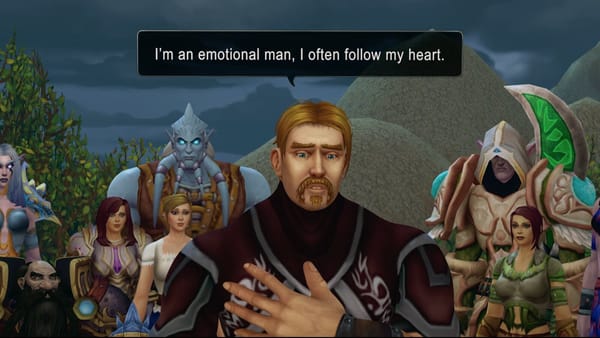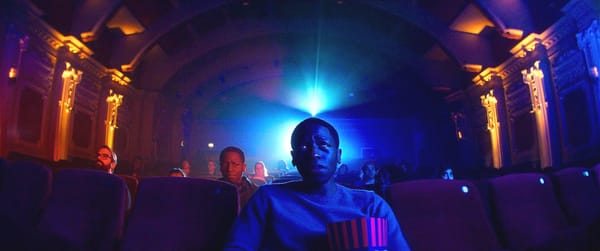Eyeless in Newton
Thoughts on yesterday's elections and on conflagrations and cruelties at home and abroad.
What’s the opposite of doom-scrolling? Hope-scrolling? I was up late last night doing that, so the belated thoughts I’ve been writing about the “new” Beatles song will be even more belated because, well, life comes at you fast. Especially if you’re Glenn Youngkin.
Yesterday‘s elections were a reminder that in a world of blood and grievance, it’s still possible and, more critical, necessary to thread the needle of respect for the lives and choices of others. It’s been a tough time for sanity in this country – indeed, for reality – at least since 2016, and it’s heartening that, despite what the New York Times and the Washington Post and CNN and MSNBC tell us (forget about Fox), people who live in America, as opposed to Red State diners, want their country back.
The flipping of Virginia blue, the intensity with which Ohio voters slapped down the Republican assault on women’s bodies, the near-complete repudiation of school committee book-banners and transphobes on down-ballots across the nation – all are a reminder that the majority of Americans see right-wing hypocrisy for what it is, a transparent lurch to control other people’s lives under the guise of “freedom,” Orwell’s Doublespeak on a social-media half shell. You know who had almost as much egg on their faces this morning as the Republican party? The pundits of the mainstream news media (my former employers included), who seem desperate to sell us a coming dystopia because they know we can’t stop clicking on it. Are those ridiculous Siena College polls broadcast by the Times and the Post the day before an election reflecting reality or an attempt to create it? Are the many accomplishments of the present administration not registering with average Americans because they’re not seeing them or because they’re just not being told about them? Is Joe Biden a senile old fart or a laser-eyed master of 4D chess? Something is happening here, and the Mr. Joneses of the legacy media have no idea what it is. But they still have to sell ads against it.
If it is difficult to keep the faith at this historical juncture – in the innate goodness of people, or at least their ability to see other people as identical to them in sorrows and fears and the right to live – last night’s numbers reminded me to never extinguish hope. It seems impossible right now, when trying to speak clearly about what Netanyahu’s Israel is doing in Gaza gets you called an antisemite and when trying to speak clearly about what Hamas has done and wants to do to Israel gets you labeled an Islamophobe. When actual antisemites and Islamophobes feel the freedom to push their poison on the world and where the perceived line between legitimate criticism and bigotry, humanitarian concern and hatred, seems to have vanished.
To which I can only say, as a practicing Buddhist and a fallible member of the tribe of smartish monkeys known as homo sapiens: Keep your eye on the humanity. Seek commonality, not difference, even (here’s the hard part) when the person on the other side of the divide wants you dead. Because, more often than not, that person’s hatred is operating out of fear and pain.
I went to a citizens’ action for a cease-fire in Gaza last week – a small one in my hometown. About 100 people, mostly older, mostly progressive, more Jewish than you might think. We set up shop on either side of a busy commercial street as rush hour heated up, and I was surprised that nearly half the drivers that passed gave a supportive beep of the horn or a thumb’s up. Well, it’s a dark blue corner of a deep blue state.
On one side of the street, by sheer coincidence, lives an Israeli family, who were – to put it mildly – distressed at what was unfolding outside their front fence. Three young children stood in the yard, wide-eyed. Their grandfather, barrel-chested and white-haired, came out to the sidewalk to argue with the protesters, demanding to know whether they had ever lived in Gaza (because he had) and angrily trying to counter their positions with facts and history and personal experience. He was talking more than listening, but at least he was trying to engage in good faith.
His grown daughter heard one of the protesters – an older woman – make the tactical and moral mistake of referring to Hamas as “freedom fighters,” and furiously stalked back into the house shouting “I’m done!” Her mother, the older man’s wife, stayed outside, growing more visibly upset as she implored her husband to come back to the house and he snapped at her to leave him alone. I could feel her fear — the earth trembling beneath her feet; the safe harbor she knew as America, Massachusetts, Newton, suddenly as threatening as the places from which her ancestors and maybe she herself had fled.
And here I witnessed at close range how quickly fear can metamorphose into hatred and the need for annihilation to nullify one’s suffering. One of the protesters, trying to appeal to the old woman’s conscience, said something to the effect of “Don’t you care that thousands of children in Gaza are being killed?” At which the woman took a step back as if she’d been slapped, and, waving her hands, screamed, “I don’t care! Let them all die!”
. . .
We all were stunned into silence for a long moment. Even her husband looked stricken. Then several of the protesters started yelling, look, look, there it is, there’s the face of hate, the true face of Zionism, did you see? Did you hear? But the old woman had gone inside.
Okay. There are more than enough good intentions and horrific designs at the moment to go around the world twice. There are victims and oppressors, and they‘re not always where you think. A great deal of naivete exists out there and, in a few places, if you know where to look for it, there is wisdom. History has periods of social fusion and fission, of coming together and ripping apart, and it is the intention and triumph of Hamas that they have ignited the latter half of the cycle, with no sight beyond the great curve of events of the wheel turning around again. If these aren’t the actual worst of times, they make us fear the worst.
For what it’s worth – and it may turn out to be cold comfort – the election numbers last night served notice that the wheel does turn back around toward a recognition of the common good and a rejection of fear and divisiveness. Can it hold? Can it spread? Are we only the sum of our blood feuds? Can we just put the people who want to kill each other in a cage and let them have at it? And — most important of all — can we imagine the world we want to see on the other side of this terrible moment? Because if we can’t, it will never, ever become reality.
Thanks for reading. Feel free to add your thoughts (he said, donning his asbestos suit). Comments are open to all today.
Feel free to pass this along to others.
Or subscribe — I usually talk about films but am occasionally moved to address other matters.





